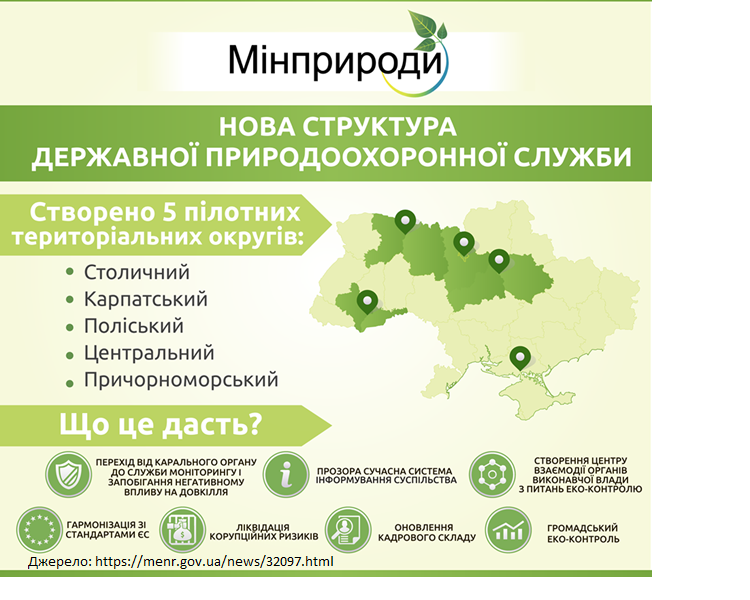On 21 February 2018, the Cabinet of Ministers of Ukraine liquidated 12 territorial bodies of the State Environmental Inspectorate that operated on regional (oblast) level:
State Environmental Inspectorate in the Autonomous republic of Crimea
State Environmental Inspectorate in Zhytomyr region
State Environmental Inspectorate in Ivano-Frankivsk region
State Environmental Inspectorate in Kyiv region
State Environmental Inspectorate in Poltava region
State Environmental Inspectorate in Rivne region
State Environmental Inspectorate in Cherkasy region
State Environmental Inspectorate in Chernivtsi region
State Environmental Inspectorate in the city of Kyiv
State Environmental Inspectorate in the city of Sevastopol
State Azov-Black Sea Environmental Inspectorate
State Environmental Inspectorate of Northern-West region of the Black Sea
Instead, there were created 5 interregional inspectorates:
State Environmental Inspectorate of capital circuit (the city of Kyiv and Kyiv region)
State Environmental Inspectorate of the Carpathian circuit (Ivano–Frankivsk and Chernivtsi regions)
State Environmental Inspectorate of central circuit (Poltava and Cherkassy regions)
State Environmental Inspectorate of Polissia circuit (Zhytomyr and Rivne regions)
State Environmental Inspectorate of Crimean-Black Sea circuit
This decision was adopted for implementation of the Concept of reformation of the system of state supervision (control) in the area of environmental protection (hereinafter – the Concept).

However, the Concept itself envisages quite different measures, in particular:
The State environmental Inspectorate of Ukraine should have been canceled and substituted with the State Environmental Service with a new structure of territorial bodies. What the government did:
Created new territorial bodies instead of creating the new central body.
New territorial bodies should have been in the structure of the new central environmental body. What the government did:
created them within the structure of the State Environmental Inspectorate of Ukraine.
Territorial bodies of environmental control should have been created on the level of regions and oblasts. What the government did:
canceled part of oblast territorial bodies and created only interregional ones.
The reform of control system envisages the change of the procedure of performing it.
What the government did:
changed the system of bodies but not the procedure of performing control.
The reform is carried out but not in the form that was presented to the public and not in the way envisaged by the Concept.
In fact, the government united territorial bodies of the State Environmental Inspectorate of Ukraine into bigger units. However, the procedure of control was not changed. The monitoring is not performed, there is no material and technical base for monitoring, due to which the environmental control has no preventive function and there are no data on the state of and changes in the environment. Currently regional environmental inspectors have no capacity to respond promptly to violations on the local level. Creation of bigger territorial bodies of the State Environmental Inspectorate will make control even more inert. Therefore, the changes that take place in fact do not have an impact on the environmental control system.
This is particular sad in view of the fact that Ukraine is leading in the world ratings of environmental pollution and mortality rate related to environmental pollution. For example, according to the World Health Organization, as of 2012, Ukraine is the sixth top country by the overall number of deaths (54507) and the first top in the world by the number of deaths for 100 000 persons (120 deaths) as a result of air pollution. Moreover, as of 2015, on average one fourths of all samples of drinking water taken from the system of water supply and private wells in Ukraine do not comply with the EU standards.
Nevertheless, the reforms in environmental protection planned and implemented by the Ministry of Environment and the government of Ukraine are aimed at preserving Ukraine on the leading places in the above mentioned ratings for the decades ahead.
For further information please contact
Alla Voytsikhovska, EPL environmental scientist of the 1st category
alla.voytsyhovska@gmail.com, +380 32 225 76 82
Natalia Kuts, lawyer, EPL analyst
natalia.kuts1@gmail.com, +380 32 225 76 82
Sophia Shutiak, EPL senior lawyer
s.shutiak@epl.org.ua, +380 32 225 76 82

